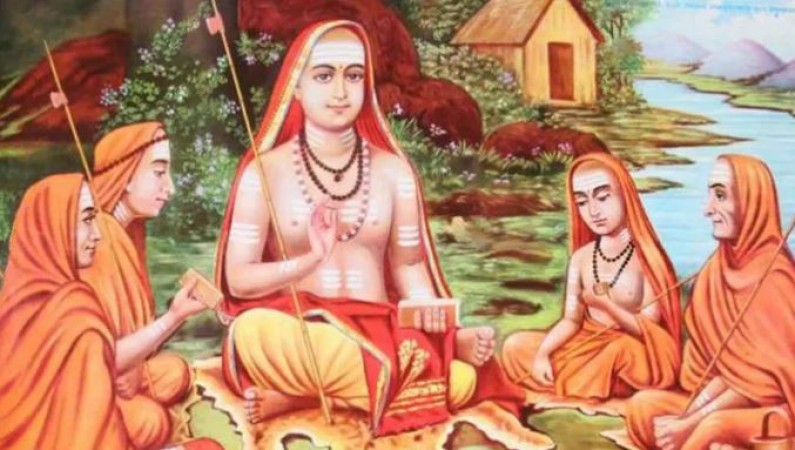
Adi Shankara, also known as Shankaracharya, was a great philosopher and theologian who lived in India during the 8th century CE. He is widely regarded as one of the most influential figures in the development of Hindu philosophy, particularly in the Advaita Vedanta tradition. Adi Shankara's teachings and commentaries on ancient texts have had a profound impact on the understanding and interpretation of Hinduism.
Born in Kerala, South India, Adi Shankara displayed extraordinary intelligence and spiritual inclination from an early age. Legend has it that he became a student of Govinda Bhagavatpada, a disciple of the renowned sage Gaudapada. Under his guru's guidance, Shankara mastered the intricacies of Vedanta philosophy and undertook a rigorous study of the ancient scriptures, including the Upanishads, Bhagavad Gita, and Brahma Sutras.
Also Read: Kailasanathar Temple: Oldest Shiva Temple
Adi Shankara is best known for his formulation and exposition of Advaita Vedanta, which espouses the non-dualistic nature of ultimate reality. According to Advaita Vedanta, the ultimate truth (Brahman) is devoid of any distinctions or dualities and is the underlying essence of all existence. Shankara's teachings emphasized the unity of the individual soul (Atman) and Brahman, asserting that self-realization and liberation could be attained by realizing this essential oneness.
Shankara's philosophical ideas were not merely theoretical; he actively engaged in debates and discussions with scholars of different philosophical schools, such as Buddhism and Jainism. These debates not only showcased his profound knowledge but also demonstrated his ability to reconcile conflicting viewpoints and establish the supremacy of Advaita Vedanta.
Also Read: Ekambaranathar Temple: Thousand Pillar Halls
In addition to his philosophical contributions, Adi Shankara is credited with reviving and reforming many Hindu institutions. He established four monastic orders (mathas) in different parts of India, which became centers of spiritual and intellectual learning. These mathas served as hubs for the preservation and dissemination of Vedic knowledge, and they continue to exist to this day, playing a crucial role in the propagation of Hindu philosophy and culture.
Shankara also composed numerous hymns and devotional songs that are still widely revered. His compositions, such as the "Bhaja Govindam" and "Soundarya Lahari," reflect his deep devotion to the divine and his ability to convey profound spiritual truths in simple and melodious verses.
Also Read: Tirupati Balaji: Gratitude To The Deity
Despite living a relatively short life, Adi Shankara's impact on Hindu philosophy and spirituality cannot be overstated. His teachings continue to inspire millions of seekers and scholars, transcending the boundaries of time and place. His intellectual brilliance, spiritual depth, and unwavering dedication to the pursuit of truth make him a revered figure in the history of Indian philosophy and a guiding light for those seeking self-realization and liberation. Adi Shankara's legacy endures as a testament to the power of wisdom, devotion, and the eternal quest for ultimate reality.
Also Read: Bhadrachalam Temple: Principal Deity Rama
The Enchanting Amarnath Cave: A Spiritual Odyssey to Lord Shiva's Divine Abode
Sri Venkateswara Temple: A Divine Saga of History and Worship